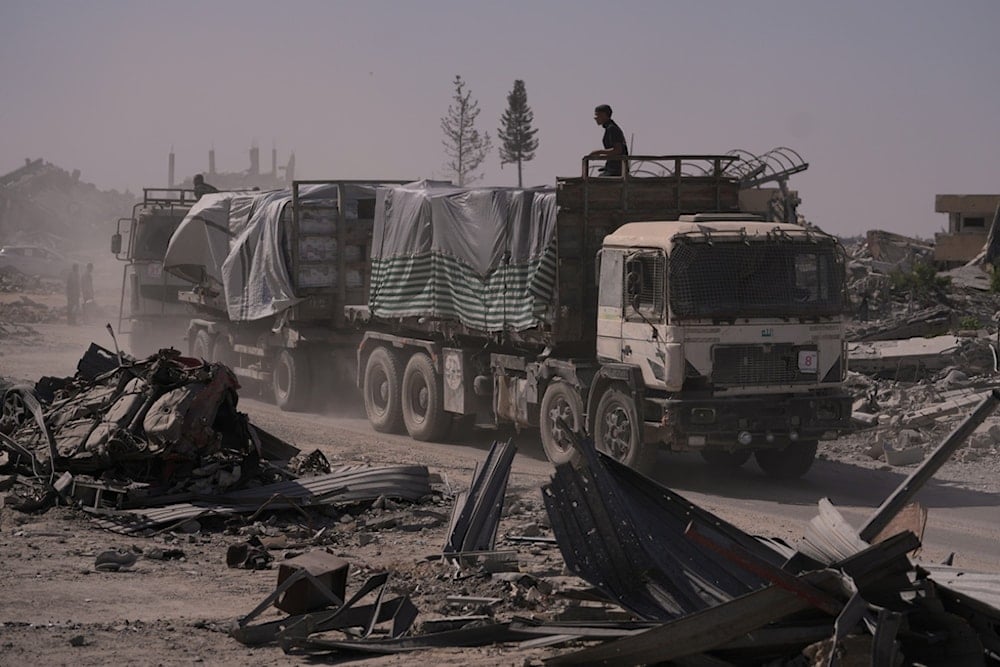41 aid groups slam Israeli blocking of aid shipments to Gaza
Despite a ceasefire, food supplies in Gaza remain inadequate, with aid groups warning of famine conditions and blocked crossings limiting essential nutrition access.
-

Trucks carrying humanitarian aid drive through Khan Younis, in the southern Gaza Strip, Monday, October 20, 2025. (AP)
Forty-one organizations working on the ground in Gaza have urged "Israel" to honor its obligations under the ceasefire and international law, allowing humanitarian aid to reach those in need, Oxfam reported.
Since the ceasefire went into force, Israeli authorities have repeatedly blocked shipments of essential assistance, while a new, restrictive INGO registration process has further delayed urgent relief operations, Oxfam said in a joint letter with 40 other organizations, including Médecins Sans Frontières and the Norwegian Refugee Council.
17 INGOs denied entry
Between 10 and 21 October 2025, 17 international NGOs had critical shipments, including water, food, medical supplies, tents, and other essentials, denied entry into Gaza, the letter detailed. Nearly 94% of all rejections targeted INGOs, with three-quarters citing that the organizations were “not authorized” to deliver aid, even for groups with long-standing registration approved by both Palestinian and Israeli authorities.
The repeated denials, according to the letter, suggest a continued politicization of aid, contravening both the letter and spirit of the ceasefire. Supplies are prepared, staff are ready, and the only barrier is access.
"Israeli authorities must respect international humanitarian law and the ceasefire agreement," the organizations said.
99 INGOs aid delivery requests rejected
From 10–21 October, 99 aid delivery requests by INGOs were rejected, alongside six requests from UN agencies. Denied aid included food, blankets, tents, hygiene kits, medical supplies, and children’s clothing, all items that should be freely allowed under the ceasefire, the letter added.
Almost $50 million in essential goods, food, medical supplies, hygiene items, and shelter materials, remain stockpiled at crossings and warehouses, unable to reach those in need, it stressed.
It further warned that with winter approaching, many Palestinians face freezing conditions in makeshift shelters without heating, clean water, or sanitation facilities. Without immediate, unrestricted access, preventable deaths will rise.
Restrictions put coordination at risk
According to the joint letter, Israeli restrictions not only deprive Palestinians of lifesaving aid but also undermine the coordination of Gaza’s response system, which depends on cooperation among local organizations, national institutions, UN agencies, and international NGOs.
"The restrictions are depriving Palestinians from lifesaving aid and undermining coordination of the response system in Gaza which relies on collaboration between local organizations, national institutions, UN agencies and international NGOs," Oxfam said in the joint letter with 40 other organizations, including Médecins Sans Frontières and the Norwegian Refugee Council.
"Humanitarian access is a legal obligation under international law, not a concession of the ceasefire. The ceasefire must ensure a lasting end to hostilities and guarantee the free, safe, principled and sustained flow of aid in line with Palestinians rights to safety, dignity, and self-determination. Anything less risks turning relief into yet another broken promise. Israel’s new registration system must be rescinded to allow aid to move freely, unimpeded and unrestricted," it added.
Food supplies fail to meet the nutritional needs
Describing how food supplies into Gaza remain insufficient to meet the nutritional needs of the population, Bahaa Zaqout, Director of External Relations at the Palestinian NGO PARC, described the situation to Reuters as "catastrophic" during a video briefing from Deir el-Balah. "Even two weeks after the ceasefire began, the crisis continues," he said.
With some areas of the besieged enclave already experiencing famine conditions, Zaqout noted to the news agency that while commercial trucks have been allowed to bring in items such as biscuits, chocolate, and soda, essential items like seeds and olives remain restricted. "These do not respond to the minimum nutritional values required for children, women, and the most vulnerable groups," he stressed.
Even when fruits and vegetables are available, their high prices make them inaccessible to most families. A kilogram of tomatoes now sells for 15 shekels (approximately $4.50), compared to just one shekel before the war.
COGAT, the Israeli military body responsible for overseeing aid into Gaza, did not respond to Reuters' requests for comment.
Read more: 'Israel' calculated Gaza’s food needs, then ignored its own math
Limited crossings block full aid delivery
The United Nations World Food Programme (WFP) stated that while the volume of aid entering Gaza has increased, it remains far below the required 2,000 tons per day. Only two crossings are currently operational, and none are open to the famine-stricken northern areas.
The ceasefire agreement, brokered by US President Donald Trump, promised the delivery of "full aid" into Gaza. Yet Oxfam's Bushra Khalili told Reuters, "We expected Gaza to be flooded with aid the moment the ceasefire began, but that's not what we're seeing."
While limited quantities of aid are entering the enclave, aid groups argue that the nutritional crisis in Gaza will persist unless restrictions are eased and crossings fully opened. The gap between pledged humanitarian support and reality on the ground continues to widen, leaving millions at risk.
Read more: Google hosts Israeli propaganda denying famine in Gaza

 5 Min Read
5 Min Read










